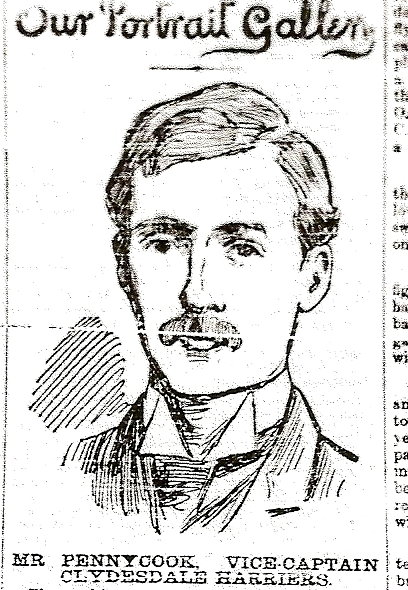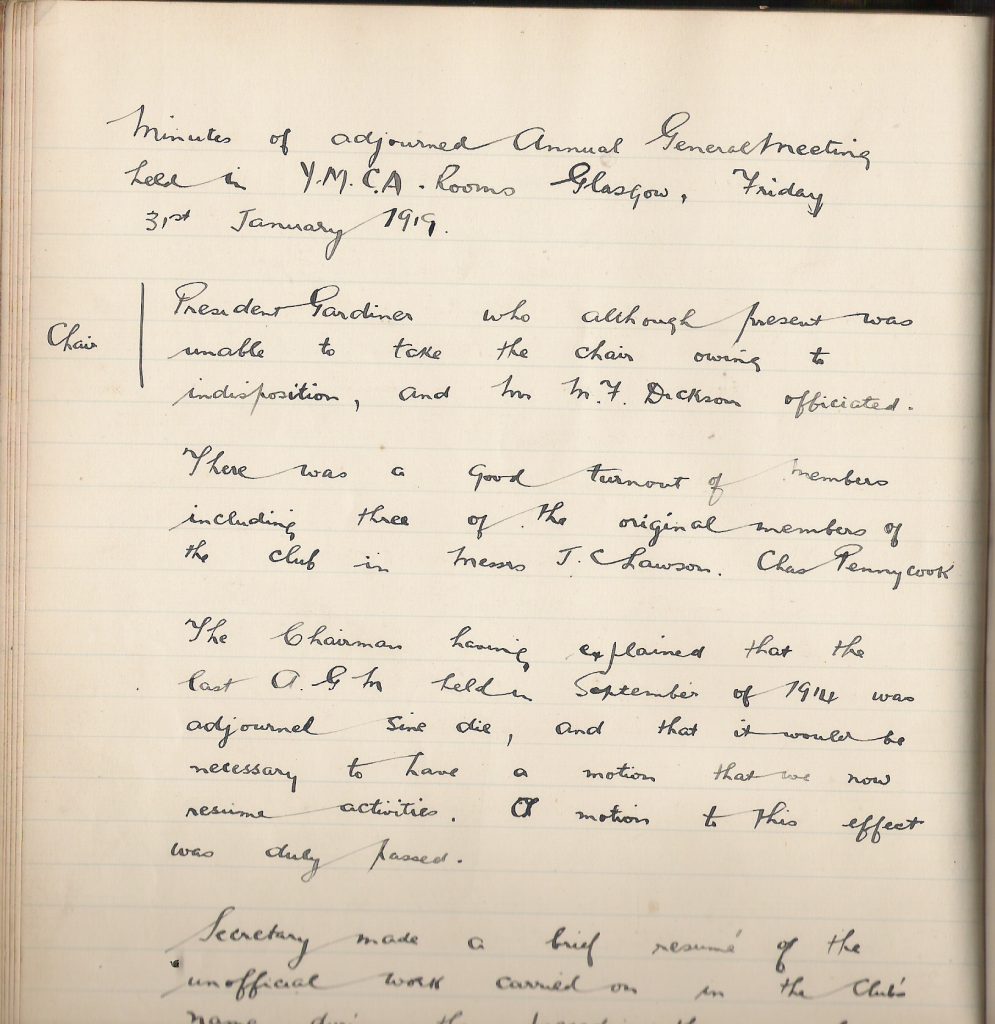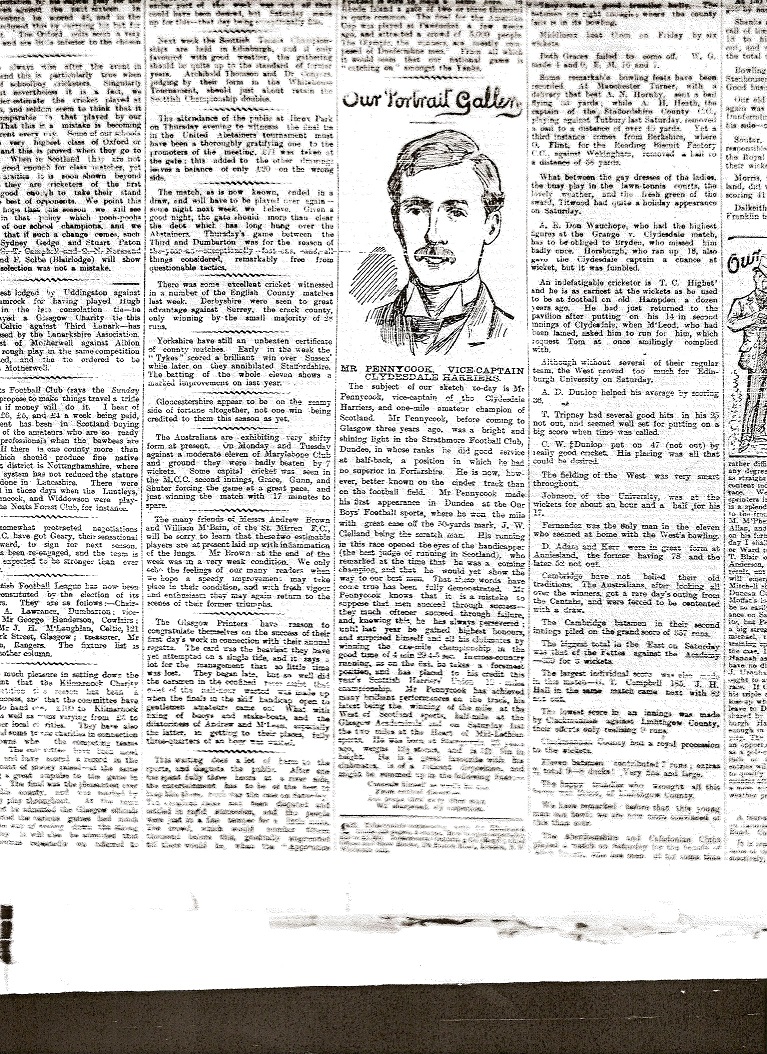Charles Pennycook not only had one of the longest active connections with the club of any of the founder members, but was a top class runner and Scottish Champion in the 1880’s and 90’s going on to be a senior office holder with the SAAA. He had started his sporting career as a footballer in Dundee taking up athletics just before he moved to Glasgow and joining the Harriers.
If we go back to the first year when any competitive records were kept, 1887/88, he was a member of Headquarters District Number Three which covered Kelvin, Maryhill and Milton in the North and West of the City. He won three first prizes and three third place awards. A year later and he was Vice Captain with Andrew Hannah as captain and that year he won the SAAA Mile Championship in 4:29.8 which was the first time that 4:30 had been bettered in the championship. At the same meeting he was second in the 10 miles to Andrew Hannah. Over the season he won 8 first prizes and four seconds. The club at that time gave gold medals for setting records and he won two that year: at Queens Park Sports where he was timed at 4:31 and two fifths for the Mile plus another for Camelon Sports 1 Mile of 4:32 3/5th (both times were off 15 yards in handicap races). Over the country it was the time of the split with the SCCA and he was second in the SHU Inter Counties in 79:28.
In 1889/90 he went one better and won the Scottish Harriers Union Cross Country Championship, the individual cross country championship of Scotland and the county cross country championship. Colin Shields in his official history of the SCCU reported that “Charles Pennycook, despite losing a shoe two miles from the finish won by 21 seconds from Andrew Hannah.” He was the subject of a pen portrait in ‘The Scottish Referee’ of 9th June 1890 which ran more or less as follows.
“C Pennycook: Vice Captain, Clydesdale Harriers
One Mile amateur champion of Scotland, he started as a half back in Strathmore FC, Dundee, before coming to Glasgow three years ago. There was no superior half back in Perthshire. At Our Boys FC Sports in Dundee he won the Mile off 50 yards. The handicapper predicted that he would be the best in Scotland. “Mr Pennycook knows that it is a mistake to suppose that men succeed through success – they much oftener succeed by failure and knowing this he has always persevered until last year he gained highest honours and surprised himself and all his clubmates by winning the One Mile Championship in 4 minutes 29 and four fifth seconds. In Cross Country he takes a foremost position and has placed to his credit in this year’s SHU 10 miles Championships. 25 years old, 5’9” and 12½ stone he is of reticent disposition.”
On the track that summer he took seven firsts, one second and two thirds. In 1890/91 the summer prizes totalled seven: four first, one second and two thirds. In 1891/92 there were eleven track awards (6 firsts, 2 seconds and 3 thirds) but the big one was winning the Scottish Cross Country Championship from Andrew Hannah. Colin Shields commented on the race as follows: “Charles Pennycook interrupted his club mate Andrew Hannah’s bid for a hat trick of individual titles but continued Clydesdale’s domination of the individual race. He scored a convincing victory over Hannah with Carment (Edinburgh) third.” Now that the split was over he had beaten all the top runners from the top clubs in the country.
His competitive activities seemed to stop then and from 1892/93 his membership continued although he was not on the Committee in any capacity. Then in 1895/96 he was back on the Committee and was also the committee representative to the Dunbartonshire Section and for the first time he appeared on the Finance Committee. After two years in these posts he was elected Vice President in 1897/98 while retaining the Finance Committee and Dumbartonshire Section representative positions. These were held until 1898/99 when he disappeared from the Committee after a year as representative to the Airdrie Section. In seasons 1900/01, 1901/02 and 1902/03 he held positions on the Finance Committee and as an auditor. Coming off the Committee in season 1903/04 he remained as auditor until 1912/13.
At the Coming of Age 21st Anniversary Dinner in 1906 chaired by his friend Alexander Kennedy he proposed the toast of the NCCU of Scotland at the Grosvenor Restaurant in Glasgow. Now on the SAAA Committee as a representative of Arthurlie FC he became President of that body in 1907/08. The club had several representatives on the governing body at the time, each representing other clubs while still functioning as Clydesdale Harriers. The work that he had done for the club was recognised when he was elected Honorary President in 1909/10 and held that post until 1912/1913 all the while acting as club auditor. Honorary President is not to be confused with club President which is a working position in the club – the Honorary Presidency is just that, an honour bestowed by the club.
After the war he maintained his connection with the club and was one of four founder members – MF Dickson, J Erskine and JC Lawson being the other three – to attend the first committee meeting after the war – the extract from the minutes of the time is above.
At the 40th Anniversary Dinner in 1925, Sir Alexander Kennedy referred to the work done by Charles Pennycook in bringing together all the available founders of the movement. He continued to come around the club and he maintained his friendship with fellow pioneers such as Andrew Hannah and Sir Alexander Kennedy. In 1928 when Kennedy was ill, and the club sent commiserations, Charles Pennycook replied on behalf of the family because of his long and continuing friendship with them.
Unfortunately he did not live to see the 50th Anniversary in 1935 when he would have been 65 years old. In the club minutes of 22nd September 1930, under the heading ‘Obituary’ the following appeared:
“Mr J Kirkland, President, referred to the loss the club had sustained through the death of Mr Charles Pennycook, a former President of the club and a Scottish one mile and ten miles champion. It was agreed that a minute should be made of our regret at his passing and of our thanks for the many services that he had rendered the club.”


